
Also by this author: The God Who Sees: Immigrants, the Bible, and the Journey to Belong
Published by Brazos Press on October 18, 2022
Genres: Non-Fiction, Racial Reconciliation
Buy on Amazon
Goodreads

Many American Christians have good intentions, working hard to welcome immigrants with hospitality and solidarity. But how can they do that in a way that puts immigrant neighbors first rather than pushing them to the fringes of white-dominant culture? That's exactly the question Karen González explores in Beyond Welcome.
A Guatemalan immigrant, González draws from the Bible and her own experiences to examine why the traditional approach to immigration ministries and activism can be at best incomplete and at worst harmful. By advocating for moving immigrants to the center of the conversation, González helps readers grow in discipleship and recognize themselves in their immigrant neighbors. Accessible to any Christian who is called to serve immigrants, this book equips readers to take action to dismantle white supremacy and xenophobia in the church. They will emerge with new insight into our shared humanity and need for belonging and liberation.
I was first introduced to Karen Gonzalez with her 2019 book from Herald Press entitled The God Who Sees, a part-memoir, part-immigration policy reform, part-biblical reflection that began with the words “Will we live out the radical and subversive hospitality that Jesus modeled for us?” Four years later, Gonzalez has returned to continue the conversation with Beyond Welcome: Centering Immigrants in Our Christian Response to Immigration.
Gonzalez starts with a discussion of assimilation. Many American Christians give positive lip service to immigration so long as it is discussed within the confines of assimilation. It is expected that immigrants leave behind their language, culture, traditions, and religion and embrace the American (and White evangelical Christian) way. Many of us truly do want diversity—but we want that diversity to conform to our leadership, our standard, and make us comfortable. A multi-ethnic group is fine, but only under the heading of an amorphous white monoculture. Or, as Gonzalez puts it “They want the comfort of knowing that white supremacy will not be toppled, though they would never use those words explicitly.” Gonzalez instead shows readers how forced assimilation dehumanizes immigrants and calls believers toward a more empathetic perspective.
The second part of the book details a biblical perspective on welcoming the stranger, recalling much of the content of The God Who Sees. She begins with an anecdote about how different cultural groups interpret the parable of the Prodigal Son (which, it should be noted, calling it such already belies a westernized interpretation of the story). In sharing the story with Russian and Kazakh students, the focus of the story was something well-known to them: famine. In sharing the story with an Ethiopian friend, the focus was on the shame brought in abandoning the family. Both of these perspectives are closer to what Jesus’s audience might have felt than the Western view where the prevailing trouble is in how the son spent his wealth. In this story and throughout this part of Beyond Welcome, Gonzalez shares the theological value that immigrants bring into majority cultures.
The final part moves to a history of immigration and, particularly salient for Americans, makes the case for how immigration is a near universal experience—though it is often much easier for those socialized as white. The final chapter of Beyond Welcome envision the community of the church as the Kin-dom of God. Not Kingdom. Kin-dom. The focus being on the universal kinship between all people made in God’s image and how that belongingness should—especially within the church—be extended to all.
The American church and American culture have an immigration problem. But the problem isn’t the immigrants, it’s our perspective toward them. Beyond Welcome invites readers to go beyond the minimum requirements of co-existence and offers a biblical rich mandate of honoring and caring for those from other places.
